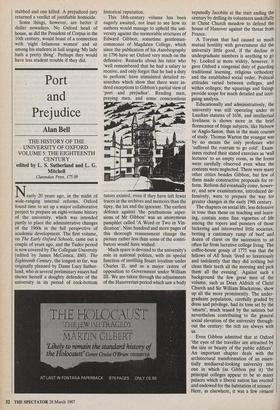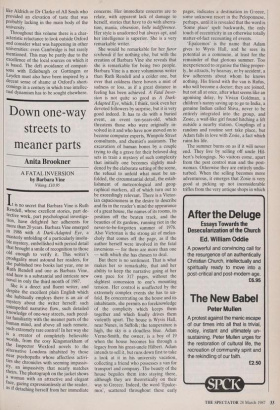Port and Prejudice
Alan Bell
THE HISTORY OF THE UNIVERSITY OF OXFORD VOLUME 5: THE EIGHTEENTH CENTURY edited by L. S. Sutherland and L. G. Mitchell
Clarendon Press, £75.00
Nearly 20 years ago, in the midst of wide-ranging internal reforms, Oxford found time to set up a major collaborative project to prepare an eight-volume history of the university, which was intended partly to place the administrative changes of the 1960s in the full perspective of academic development. The first volume, on The Early Oxford Schools, came but a couple of years ago, and the Tudor period is now covered by The Collegiate University (edited by James McConica, L60). The Eighteenth Century, the longest so far, was originally planned by Dame Lucy Suther- land, who in several preliminary essays had shown herself a doughty defender of the university in its period of rock-bottom historical reputation.
This 18th-century volume has been eagerly awaited, not least to see how its authors would manage to uphold the uni- versity against the memorable strictures of Edward Gibbon, sometime gentleman- commoner of Magdalen College, which since the publication of his Autobiography in 1796 have set Oxford very much on the defensive. Remarks about his tutor who 'well remembered that he had a salary to receive, and only forgot that he had a duty to perform' have stimulated detailed re- searches which show that there were in- deed exceptions to Gibbon's partial view of 'port and prejudice'. Reading men, praying men, and some conscientious tutors existed, even if they have left fewer traces in the archives and memoirs than the tipsy, the lax and the ignorant. The earliest defence against 'the posthumous asper- sions of Mr Gibbon' was an anonymous pamphlet called 'A Word or Two in Vin- dication'. Nine hundred and more pages of this thorough reassessment change the picture rather less than some of the contri- butors would have wished.
Much space is devoted to the university's role in national politics, with •its special function of instilling Stuart loyalism under Charles II, and as a major centre of opposition to Government under William III. We are taken through the adjustments of the Hanoverian period which saw a body reputedly Jacobite at the start ending the century by drilling its volunteers unskilfully in Christ Church meadow to defend the house of Hanover against the threat from France.
A Toryism that had caused so much mutual hostility with government did the university little good, if the decline in undergraduate numbers is anything to go by. Looked at more widely, however, it gave Oxford a congenial duty of guarding traditional learning, religious orthodoxy and the established social order. Political attitudes varied between colleges, and within colleges; the squarings and fixings provide scope for much detailed and intri- guing analysis.
Educationally and administratively, the university was still operating under its Laudian statutes of 1636, and intellectual liveliness is shown more in the brief florescence of fringe subjects, like Hebrew or Anglo-Saxon, than in the main courses of study. Thomas Warton the younger was by no means the only professor who 'suffered the rostrum to go cold'. Exam- inees recited their stated exercises as 'wall lectures' to an empty room, as the forms were carefully observed even when the contents were neglected. There were many other critics besides Gibbon, but few of them made constructive proposals for re- form. Reform did eventually come, howev- er, and new examinations, introduced de- fensively, were to prepare the way for greater changes in the early 19th century.
The chapters on social life, less defensive in tone than those on teaching and learn- ing, contain some fine vignettes of life among the topers and punsters of those bickering and introverted little societies, betting a customary rump of beef and dozen of claret on the succession to an often far from lucrative college living. The coffee-house gossip of 1775 was that the fellows of All Souls 'lived so luxuriously and indolently that they did nothing but clean their teeth all the morning and pick them all the evening'. Against such a background the few great men of the volume, such as Dean Aldrich of Christ Church and Sir William Blackstone, show up all the more prominently. The under- graduate population, carefully graded by dress and privilege, had its tone set by the 'smarts', much teased by the satirists but nevertheless contributing to the general social elevation of the university through- out the century: the rich are always with us.
Even Gibbon admitted that at Oxford 'the eyes of the traveller are attracted by the size or beauty of the public edifices'. An important chapter deals with the architectural transformation of an essen- tially mediaeval-looking university into one in which (as Gibbon put it) 'the principal colleges appear to be so many palaces which a liberal nation has erected and endowed for the habitation of science'. Here, as elsewhere, it was a few virtuosi like Aldrich or Dr Clarke of All Souls who provided an elevation of taste that was Probably lacking in the main body of the university.
Throughout this volume there is a char- acteristic reluctance to look outside Oxford and consider what was happening in other universities: even Cambridge is but rarely mentioned. This may be partly due to the excellence of the local sources on which it is based. The deft avoidance of compari- sons with Edinburgh \or Gottingen or Leyden must also have been inspired by a decent sense of shame at Oxford's short- comings in a century in which true intellec- tual dynamism has to be sought elsewhere.



















































 Previous page
Previous page